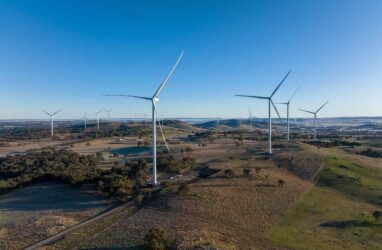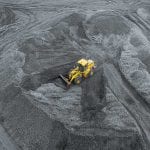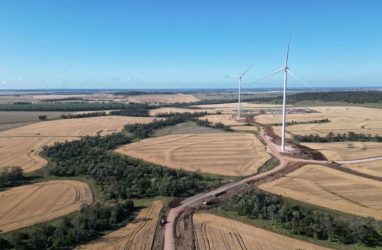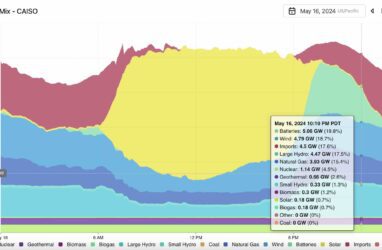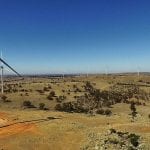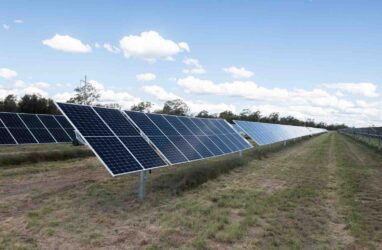Feed aggregator
China’s Guangzhou approves seagrass bed methodology
Britain’s public parks are a green lifeline – stop fencing them off for the summer | Rebecca Tamás
These spaces are crucial for our wellbeing, but cash-strapped councils are being forced to treat them as revenue earners
My local green space, Brockwell Park in Brixton and Herne Hill, south London, is an oasis of calm in the busy city. Friends catch up in the walled garden, where wisteria trails over pillars and roses and bluebells explode from the earth. In the community garden, local people work together to grow vegetables and run sessions to connect nature-deprived children to the land.
In the centre of the sometimes crushing metropolis, this park means everything to me – it keeps me sane, and it gives me hope. But this green lifeline is, every summer, taken away, as I await the arrival of the park’s music festival season with dread. As huge metal walls go up, dividing us from the green, and HGVs begin flattening the grass and soil, I feel a genuine sense of horror. A large part of the park is cut off for weeks, and our community’s heart is pulled out as people stream into events whose expensive tickets most people living round here could never afford. And the same is happening in shared green spaces all over the UK.
Rebecca Tamás is a writer of environmental nonfiction and a poet. Her most recent book is Strangers: Essays on the Human and Nonhuman
Continue reading...ANALYSIS: Australia’s Clean Energy Regulator urges Safeguard facilities to ramp up decarbonisation tech investments
‘Free Bella’: campaigners fight to save lonely beluga whale from Seoul mall
Five years after her last companion died and the aquarium’s owner pledged to free her, Bella still languishes in a tiny tank amid shops
In the heart of Seoul, amid the luxury shops at the foot of the world’s sixth-tallest skyscraper, a lone beluga whale named Bella swims aimlessly in a tiny, lifeless tank, where she has been trapped for a decade.
Her plight is urgent, with campaigners racing to rescue her from the bare tank in a glitzy shopping centre in South Korea’s capital before it is too late.
Continue reading...Has logging really stopped in Victoria? What the death of an endangered glider tells us
NZ Market: NZUs fall to 10-mth low as market says confidence in govt is lost
A 441MW wind farm opposed by David Littleproud joins queue for federal green tick
The post A 441MW wind farm opposed by David Littleproud joins queue for federal green tick appeared first on RenewEconomy.
Rules should ensure households have the financial freedom not to choose gas
The post Rules should ensure households have the financial freedom not to choose gas appeared first on RenewEconomy.
Ausgrid installs third solar-soaking community battery backed by federal funding
The post Ausgrid installs third solar-soaking community battery backed by federal funding appeared first on RenewEconomy.
SwitchedOn Podcast: Energy rebates and missed opportunities
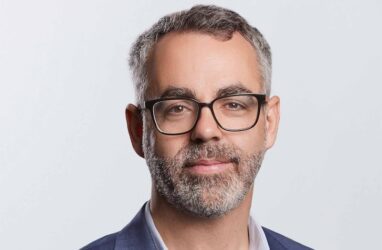 Why a $300 one-off energy bill rebate misses an opportunity for permanent bill relief.
Why a $300 one-off energy bill rebate misses an opportunity for permanent bill relief.
The post SwitchedOn Podcast: Energy rebates and missed opportunities appeared first on RenewEconomy.
Big polluters will be forced to come clean on emissions under proposed rule change
The post Big polluters will be forced to come clean on emissions under proposed rule change appeared first on RenewEconomy.
Plans unveiled for massive $3.5 billion wind and solar powered green iron project for Queensland
The post Plans unveiled for massive $3.5 billion wind and solar powered green iron project for Queensland appeared first on RenewEconomy.
Deeper, longer, cleaner: Big batteries extend domination of California’s evening demand peaks
The post Deeper, longer, cleaner: Big batteries extend domination of California’s evening demand peaks appeared first on RenewEconomy.
Brookfield targets Forrest’s Windlab renewable developer after Origin snub
The post Brookfield targets Forrest’s Windlab renewable developer after Origin snub appeared first on RenewEconomy.
The Guardian view on net zero: a bank-led green transition won’t work for Britain | Editorial
A state industrial strategy is needed to reduce carbon output, produce cleaner growth and redistribute jobs around the UK
Theresa May and Boris Johnson both argued for levelling up and for a state-supported green transition undergirded by an industrial strategy. Neither delivered and their successor, Rishi Sunak, has repudiated their legacy as prime minister. He looks to the City to deliver growth, with banks determining the rate of investment to meet the challenge of the climate emergency. This is a recipe for failure. The Climate Change Committee (CCC), the government’s independent advisers on cutting carbon emissions, warned last year of “worryingly slow” progress to meet net zero targets. The government is not engaging on what it will take to decarbonise.
Weaning the country off fossil fuels and on to green energy is a complex transition that should be a job for the state, not the free market. Yet Britain is bottom of the league for state spending on renewables in the Organisation for Economic Co-operation and Development. In the offshore industry alone 30,000 workers could end up with nowhere to go by 2030 without new roles in green industries. Relying on big finance to meet that gap will entrench today’s failing model, which emphasises the need to attract significant capital flows through deregulation and privatisation, strengthening the hand of boom-and-bust financial services and weakening labour rights. The flipside is a bigger trade deficit and a destructive politics of redistribution to asset holders and to London.
Continue reading...Ships in some UK port cities create more air pollution than cars
Milford Haven, Southampton and Immingham top the list for emissions of gases and particulates
Ships calling at the UK’s most-polluted ports produce more nitrogen oxides than all the cars registered in the same cities or regions, analysis has shown.
A report from Transport & Environment (T&E) said that ships were continuing to discharge huge quantities of air pollutants at ports, with Milford Haven, Southampton and Immingham topping the list for emissions of harmful sulphur oxides and fine particulate matter (PM2.5) as well as nitrogen oxides (NOx).
Continue reading...Vampire finches and deadly tree snakes: how birds went worldwide – and their battles for survival
A new exhibition at the Natural History Museum in London includes ‘tragic’ tales of species wiped out from their natural habitats
Douglas Russell, a senior curator at London’s Natural History Museum, was examining a collection of nests gathered on the island of Guam when he made an unsettling discovery.
“The nests had been picked up more than 100 years ago, and I was curating them with the aim of adding them to the museum’s main collection. They turned out to be one of the most tragic, saddest accumulations of objects I’ve ever had to deal with,” Russell told the Observer last week.
Continue reading...Plibersek says no to solar project surrounded by coal seam gas fields
The post Plibersek says no to solar project surrounded by coal seam gas fields appeared first on RenewEconomy.
They’re fast. Pedestrians are furious: ‘fat’ ebikes divide Australian beach suburbs
Popular among teenagers, the large electric bikes have triggered numerous complaints to councils as fears grow for the safety of riders and pedestrians
If you frequent coastal towns or suburbs around Australia, you might be familiar with the sight of large, speedy ebikes zooming along the footpath. Fat bikes, as they’re commonly known, have been described as the monster trucks of the cycling world. With wide, thick tyres and seats big enough for two, the electric bicycles are designed to handle sand and off-road terrain.
But they have also garnered a cult status among young people, who are using them to get around with friends, take their surfboard to the beach and commute to school.
Continue reading...Toxic ‘forever chemicals’ ubiquitous in Great Lakes basin, study finds
PFAS chemicals present in air, rain, atmosphere and water in basin, which holds nearly 95% of US freshwater
Toxic PFAS “forever chemicals” are ubiquitous in the Great Lakes basin’s air, rain, atmosphere and water, new peer-reviewed research shows.
The first-of-its-kind, comprehensive picture of PFAS levels for the basin, which holds nearly 95% of the nation’s freshwater, also reveals that precipitation is probably a major contributor to the lakes’ contamination.
Continue reading...



